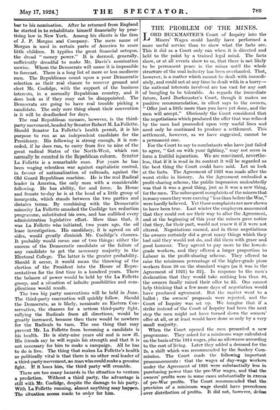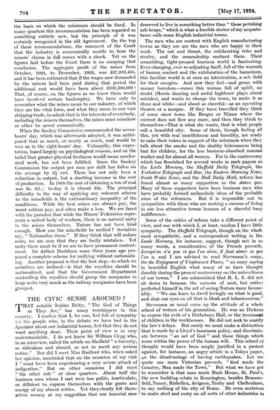THE PROBLEM OF THE MINES.
T ORD BUCKMASTER'S Court of Inquiry into the Miners' Wages could hardly have performed a more useful service than to show what the facts are. This it did as a Court only can when it is directed and held to the point by a trained legal mind. The facts show, or at all events show to us, that there is not likely to be permanent peace in the mines until the whole structure of the coal industry has been overhauled. That, however, is a matter which cannot be dealt with immedi- ately, and could not at any time be dealt with in a hurry— the national interests involved are too vast for any sort of bungling to be tolerable. As regards the immediate future, Lord Buckmaster's Court, though it makes no positive recommendation, in effect says to the owners, " Offer just a little more than you have yet done, and the men will accept." Obviously the Court considered that the negotiations which produced the offer that was refused by the men had proceeded upon very useful lines and need only be continued to produce a settlement. This settlement, however, as we have suggested, cannot be a permanent one.
For the Court to say to combatants who have just failed to agree, " Get on with your fighting," may not seem in form a fruitful injunction. We are convinced, neverthe- less, that if it is read in its context it will be regarded as the best thing the Court could have said. Let us look at the facts. The Agreement of 1921 was made after the worst strike in history. As the Agreement embodied a profit-sharing scheme, the public impression undoubtedly was that it was a good thing, just as it was a new thing, for the men. The subsequent complaints of the miners that in many cases they were earning "less than before the War," were hardly believed. Yet those complaints are now shown to have been true. Last winter the employers announced that they could not see their way to alter the Agreement, and at the beginning of this year the miners gave notice that they, for their part, would not renew it if it were not altered. Negotiations ensued, and in those negotiations the owners certainly did a great many things which they had said they would not do, and did them with grace and good humour. They agreed to pay more to the lowest- grade workers, and they offered a larger proportion to Labour in the profit-sharing scheme. They offered to raise the minimum percentage of the higher-grade piece workers from 20 on the standard wages (as it was in the Agreement of 1921) to 32i. In response to the men's declaration that they would take nothing less than 40, the owners finally raised their offer to 35. One cannot help thinking that a few more days of negotiation would have produced agreement. But the matter went to a ballot ; the owners' proposals were rejected, and the Court of Inquiry was set up. We imagine that if a strike instead of the Court of Inquiry had been the next step the men might not have turned down the owners' offer at all, or at least would have done so only by a very small majority.
When the Court opened the men presented a new programme. They asked for a minimum wage calculated on the basis of the 1914 wages, plus an allowance according to the cost of living. Later they added a demand for the 2s. a shift which was recommended by the Sankey Com- mission. The Court made the following important pronouncements : that the wages of day-wage workers under the Agreement of 1921 were substantially less in purchasing power than the pre-War wages, and that the owners' profits were in some cases substantially in excess of pre-War profits. The Court recommended that the provision of a minimum wage should have precedence over distribution of profits. It did not, however, define the basis on which the minimum should be fixed. In many quarters this recommendation has been regarded as something entirely new, but the principle of it was certainly recognized in the old Agreement. On the top of these recommendations, the comment of the Court that the industry is economically unable to bear the miners' claims in full comes with a shock. Yet on the figures laid before the Court there is no escaping that conclusion. The aggregate profit of the mines from October, 1921, to December, 1923, was £37,818,434, and it has been estimated that if the wages now demanded by the miners had been paid during that period the additional cost would have been about £102,500,000 That, of course, on the figures as we know them would have involved certain bankruptcy. We have only to remember what the mines mean to our industry, of which they are the vital force, and what they mean to our vast shipping trade, to admit that in the interests of everybody, including the miners themselves, the mines must somehow or other be saved economically.
When the Sankey Commission recommended the seven- hours' day, which was afterwards adopted, it was antici- pated that as much, or nearly as much, coal would be won as in the eight-hours' day. Unhappily, this expec- tation, based largely on psychological reasons, and on the belief that greater physical freshness would mean acceler- ated work, has not been fulfilled. Since the Sankey Commission the output per man per shift has fallen on the average by 2i cwt. There has not only been a reduction in output, but a startling increase in the cost of production. In 1888 the cost of obtaining a ton of coal was 8s. 8d. ; to-day it is almost 25s. The principal difficulty in the way of applying any coherent scheme to the minefields is the extraordinary inequality of the conditions. While the best mines can always pay, the worst seldom pay, and often make a loss. We are faced with the paradox that while the Miners' Federation repre- sents a united body of workers, there is no natural unity in the mines themselves. Nature has not been kind enough. How can the minefields be unified ? Socialists say, " Nationalize them." If they think that will reduce costs, we are sure that they are badly mistaken. Yet unity there must be if we are to have permanent content- ment. Sir Arthur Duckham some three years ago pro- posed a complete scheme for unifying without nationaliz ing. Another proposal is that the first step—to which we ourselves are inclined—is that the royalties should be nationalized, and that the Government Department controlling the royalties should group the companies in large units very much as the railway companies have been grouped.



















































 Previous page
Previous page